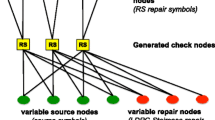Abstract
Generalized minimum distance (GMD) decoding of Reed–Solomon (RS) codes can correct more errors than conventional hard-decision decoding by running error-and-erasure decoding multiple times for different erasure patterns. The latency of the GMD decoding can be reduced by the Kötter’s one-pass decoding scheme. This scheme first carries out an error-only hard-decision decoding. Then all pairs of error-erasure locators and evaluators are derived iteratively in one run based on the result of the error-only decoding. In this paper, a more efficient interpolation-based one-pass GMD decoding scheme is studied. Applying the re-encoding and coordinate transformation, the result of erasure-only decoding can be directly derived. Then the locator and evaluator pairs for other erasure patterns are generated iteratively by applying interpolation. A simplified polynomial selection scheme is proposed to pass only one pair of locator and evaluator to successive decoding steps and a low-complexity parallel Chien search architecture is developed to implement this selection scheme. With the proposed polynomial selection architecture, the interpolation can run at the full speed to greatly increase the throughput. After efficient architectures and effective optimizations are employed, a generalized hardware complexity analysis is provided for the proposed interpolation-based decoder. For a (255, 239) RS code, the high-speed interpolation-based one-pass GMD decoder can achieve 53% higher throughput than the Kötter’s decoder with slightly more hardware requirement. In terms of speed-over-area ratio, our design is 51% more efficient. In addition, compared to other soft-decision decoders, the high-speed interpolation-based GMD decoder can achieve better performance-complexity tradeoff.






Similar content being viewed by others
References
Berlekamp, E. R. (1968). Algebraic coding theory. New York: McGraw-Hill.
Kötter, R., & Vardy, A. (2003). Algebraic soft-decision decoding of Reed–Solomon codes. IEEE Transactions on Information Theory, 49(11), 2809–2825.
Jiang, J., & Narayanan, K. (2008). Algebraic soft-decision decoding of Reed–Solomon codes using bit-level soft information. IEEE Transactions on Information Theory, 54(9), 3907–3928.
Bellorado, J., & Kavcic, A. (2006). A low-complexity method for Chase-type decoding of Reed–Solomon codes. In Proc. of IEEE international symposium on information theory (pp. 2037–2041).
Forney, G. D. (1966). Generalized minimum distance decoding. IEEE Transactions on Information Theory, 12, 125–131.
Sorger, U. K. (1993). A new Reed–Solomon code decoding algorithm based on Newton’s interpolation. IEEE Transactions on Information Theory, 39(2), 358–365.
Araki, K., Takada, M., & Morii, M. (1993). The generalized syndrome polynomial and its application to the efficient decoding of Reed–Solomon codes based on GMD criterion. In Proc. of IEEE international symposium on information theory (p. 34).
Kötter, R. (1996). Fast generalized minimum-distance decoding of algebraic-geometry and Reed–Solomon codes. IEEE Transactions on Information Theory, 42(3), 721–737.
Xia, H., & Cruz, J. R. (2007). Reliability-based forward recursive algorithms for algebraic soft-decision decoding of Reed–Solomon codes. IEEE Transactions on Communications, 55(7), 1273–1278.
Gross, W. J., Kschischang, F. R., Kötter, R., & Gulak, P. (2002). A VLSI architecture for interpolation in soft-decision decoding of Reed–Solomon codes. In Proc. of IEEE workshop on signal processing systems (pp. 39–44).
Kötter, R., & Vardy, A. (2003). A complexity reducing transformation in algebraic list decoding of Reed–Solomon codes. In Proc. of IEEE information theory workshop (pp. 10–13).
Zhu, J., & Zhang, X. (2010). Efficient generalized minimum-distance decoder of Reed–Solomon codes. In Proc. of IEEE international conference on acoustics, speech, and signal processing (pp. 1502–1505).
Kötter, R. (1996). On algebraic decoding of algebraic-geometric and cyclic codes. Ph.D. dissertation, Dept. of Elec. Engr., Linkoping University, Linkoping, Sweden.
Nielson, R. R. (2001). List decoder of linear block codes. Ph.D. dissertation, Technical University of Denmark.
Zhu, J., & Zhang, X. (2009). Factorization-free low-complexity Chase soft-decision decoding of Reed–Solomon codes. In Proc. of IEEE international symposium on circuits and systems (pp. 2677–2680).
Chen, Y., & Parhi, K. K. (2004). Area efficient parallel decoder architecture for long BCH codes. In Proc. of IEEE international conference on acoustics, speech, and signal processing (pp. 73–76).
Zhu, J., Zhang, X., & Wang, Z. (2008). Novel interpolation architecture for low-complexity chase soft-decision decoding of Reed–Solomon codes. In Proc. of IEEE international symposium on circuits and systems (pp. 3078–3081).
Ma, J., Vardy, A., & Wang, Z. (2006). Reencoder design for soft-decision decoding of an (255, 239) Reed–Solomon code. In Proc. of IEEE international symposium on circuits and systems (pp. 3550–3553).
Zhu, J., & Zhang X. (2010). High-speed re-encoder design for algebraic soft-decision Reed–Solomon decoding. In Proc. of IEEE international symposium on circuits and systems (pp. 465–468).
Zhang, X., & Zhu, J. (2010). Reduced-complexity multi-interpolator algebraic soft-decision Reed–Solomon decoder. In Proc. of IEEE workshop on signal processing systems.
Seth, K., Viswajith K. N., Srinivasan S., & Kamakoti, V. (2006). Ultra folded high-speed architectures for Reed–Solomon decoders. In Proc. of the 19th international conference on VLSI design (pp. 517–520).
Zhang, X., & Zhu, J. (2009). Interpolation-based hard-decision Reed–Solomon decoders. In Proc. of 12th international symposium on integrated circuits (pp. 175–178).
Baek, J., & Sunwoo, M. H. (2007). Simplified degree computationless modified Euclid’s algorithm and its architecture. In Proc. of IEEE international symposium on circuits and systems (pp. 905–908).
Zhang, X., & Zhu, J. (2010). Algebraic soft-decision decoder architectures for long Reed–Solomon codes. IEEE Transactions on Circuits and Systems II, Express Briefs, 57(10), 787–792.
Zhu, J., Zhang, X., & Wang, Z. (2008). Combined interpolation architecture for soft-decision decoding of Reed–Solomon codes. In Proc. IEEE intl. conf. computer design (pp. 526–531).
Author information
Authors and Affiliations
Corresponding author
Additional information
This work is supported by AFOSR under grant FA9550-09-1-0289.
Rights and permissions
About this article
Cite this article
Zhu, J., Zhang, X. Efficient Generalized Minimum-distance Decoders of Reed-Solomon Codes. J Sign Process Syst 66, 245–257 (2012). https://doi.org/10.1007/s11265-011-0600-3
Received:
Revised:
Accepted:
Published:
Issue Date:
DOI: https://doi.org/10.1007/s11265-011-0600-3




